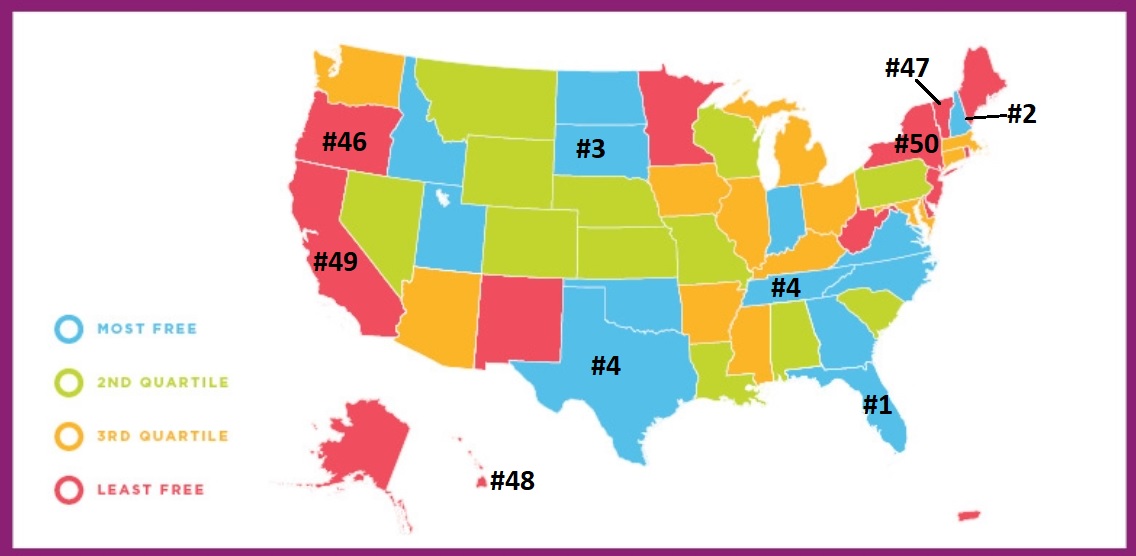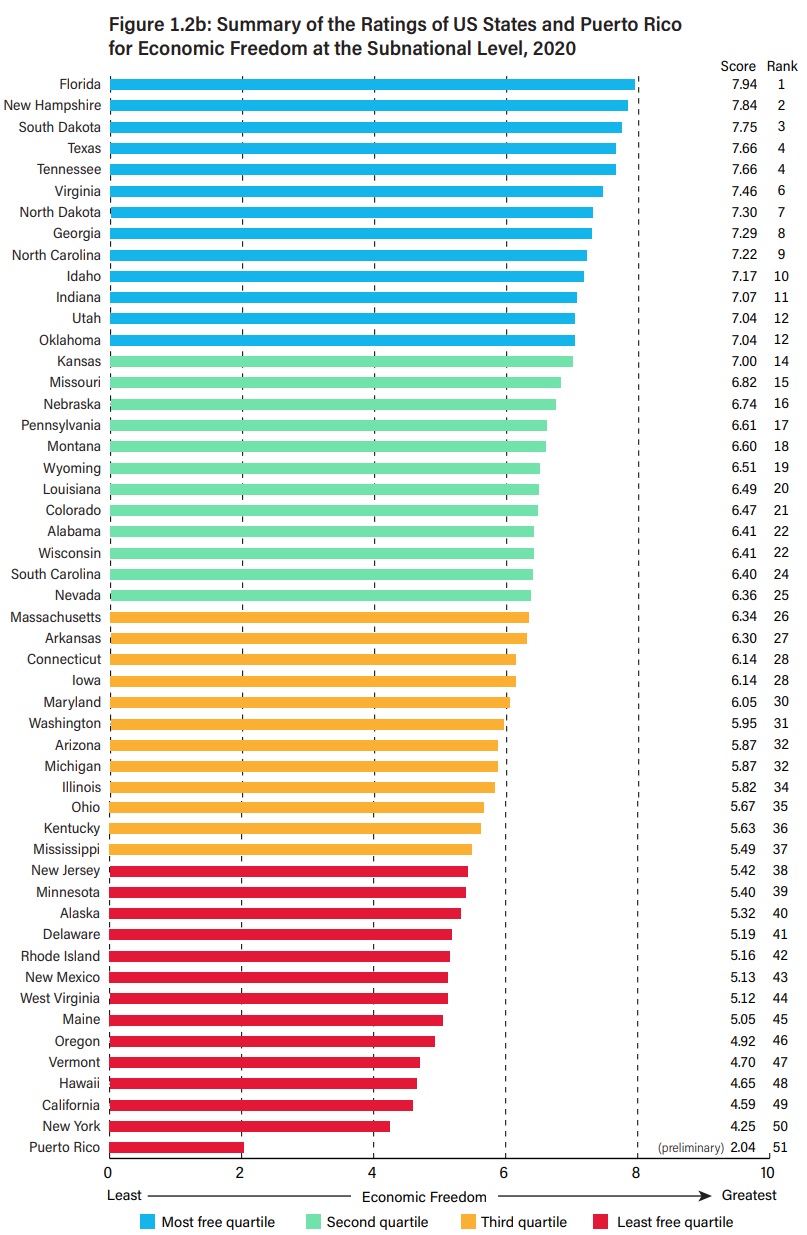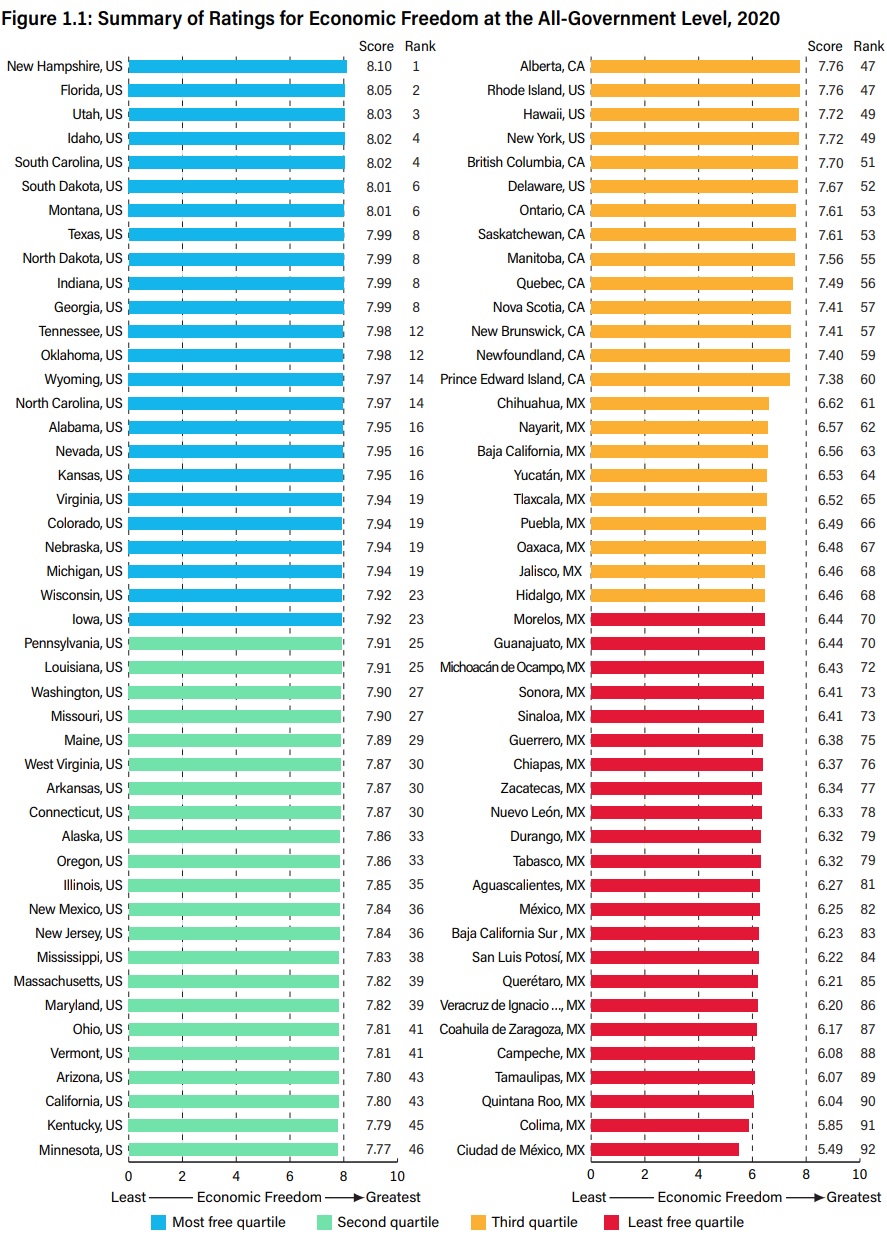–
The Most Economically Free State Is…?
According to the Fraser Institute’s Economic Freedom of the World, New Hampshire was the most economically free state in America in 2017, 2018, and 2019.
But the state famous for “Live Free or Die” has now been replaced by the Sunshine State.
The most-recent edition, which is based on 2020 data, informs us that Florida now enjoys more economic liberty than any other state.
New Hampshire still is ranked very high, coming in at #2, followed by South Dakota at #3. Texas and Tennessee are tied for #4.
What’s the one thing they all have in common? No state income tax.
Meanwhile, the report also highlights the states that (predictably) dominate the bottom of the rankings.
For the purpose of comparing jurisdictions within the same country, the subnational indices are the appropriate choice. …In the United States, the most economically free state was Florida at 7.94, followed by New Hampshire at 7.84, South Dakota at 7.75, and Texas and Tennessee at 7.66.
(Note that since the indexes were calculated separately for each country, the numeric scores on the subnational indices are not directly comparable across countries.) The least-free state was again New York at 4.25, following California at 4.59, Hawaii at 4.65, Vermont at 4.70, and Oregon at 4.92. For the first time, we have made a preliminary attempt to include the US territory of Puerto Rico in the US subnational index. It came in with a score of 2.04. The next lowest score was more than twice as high.
Here are the full rankings at the subnational level (i.e., measuring the policies that are under the control of state lawmakers).
For the first time, the report assesses Puerto Rico. Hardly a surprise to see where it ranks.
The report also has an “all-government” ranking, which includes the effect of both national and subnational governments.
On that basis, New Hampshire is in first place.
The all-government index includes…comparisons among Canadian, Mexican, and US subnational jurisdictions that take into account national policies affecting all jurisdictions within each country. …The top jurisdiction is New Hampshire at 8.10, followed by Florida (8.05), Utah (8.03), and then Idaho and South Carolina, tied for fourth (8.02).
The all-government scores allow comparison of all the state and provinces in the US, Canada, and Mexico.
The one clear takeaway is that Mexico desperately needs pro-market reforms.
I’ll close by observing that almost every US state ranks above every Canadian province.
But that wasn’t always the case. Which shows that Justin Trudeau is pushing Canada in the wrong direction even faster than American politicians are pushing the US in the wrong direction.
California is the Greece of the USA, but Texas is not perfect either!!!
Just Because California Is Terrible, that Doesn’t Mean Texas Is Perfect
January 21, 2013 by Dan Mitchell
Texas is in much better shape than California. Taxes are lower, in part because Texas has no state income tax.
 No wonder the Lone Star State is growing faster and creating more jobs.
No wonder the Lone Star State is growing faster and creating more jobs.
And the gap will soon get even wider since California voters recently decided to drive away more productive people by raising top tax rates.
But a key challenge for all governments is controlling the size and cost of bureaucracies.
Government employees are probably overpaid in both states, but the situation is worse in California, as I discuss in this interview with John Stossel.
Dan Mitchell Comparing Excessive Bureaucrat Compensation in Texas and California
But being better than California is not exactly a ringing endorsement of Texas fiscal policy.
A column in today’s Wall Street Journal, written by the state’s Comptroller of Public Accounts, points out some worrisome signs.
As the chief financial officer of the nation’s second-largest state, even I have found it hard to get a handle on how much governments are spending, and how much debt they’re taking on. Every level of government is piling up incredible bills. And they’re coming due, whether we like it or not. Even in low-tax Texas, property taxes have risen three times faster than the inflation rate and four times faster than our population growth since 1992. Our local governments, meanwhile, more than doubled their debt load in the last decade, to more than $7,500 in debt for every man, woman and child in the state. In Houston alone, city-employee pension plans are facing an unfunded liability of $2.4 billion. But too many taxpayers aren’t given the information they need to make informed decisions when they vote debt issues. Recently I spent several months holding about 40 town-hall meetings with Texans across our state. Each time, I asked the attendees if they could tell me how much debt their local governments are carrying. Not a single person in a single town had this information.
In other words, taxpayers need to be eternally vigilant, regardless of where they live. Otherwise the corrupt rectangle of politicians, bureaucrats, lobbyists, and interest groups will figure out hidden ways of using the political process to obtain unearned wealth.
P.S. The second-most-viewed post on this blog is this joke about Texas, California, and a coyote, so it must be at least somewhat amusing. If you want some Texas-specific humor, this police exam is amusing and you’ll enjoy this joke about the difference between Texans, liberals and conservatives. And if you want California-specific humor, this Chuck Asay cartoon hits the nail on the head.



